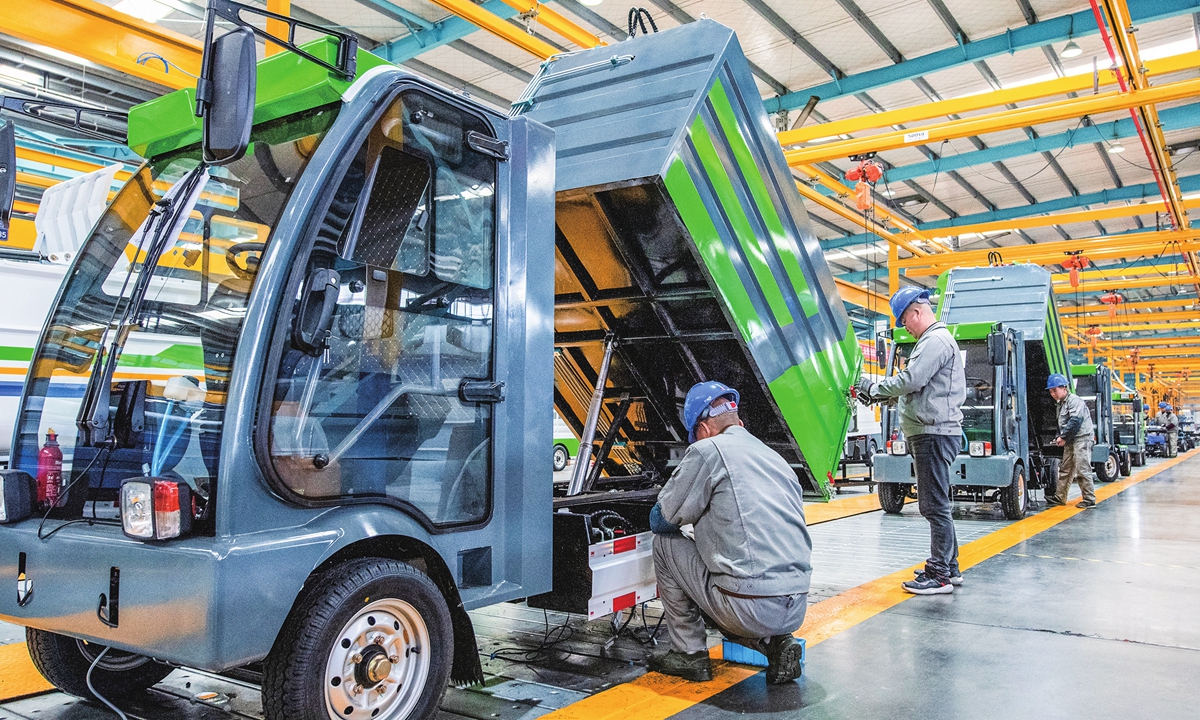
Staffers work at a new-energy vehicle (NEV) factory in Wuhu, East China's Anhui Province on February 22, 2023. China's NEV industry has entered the fast lane of development, with both domestic and foreign carmakers vying for bigger shares of the rapidly expanding market. Photo: cnsphoto
China will start to implement the China VI-b emission standards for vehicles starting from July 1, banning production, imports and sales of models that don't comply with the standards, the Ministry of Ecology and Environment said on Tuesday in a joint statement with four other authorities.
Industry observers noted the upgraded emission standards may boost sales of models that comply with current standards amid further stabilized prices, while accelerating the promotion of new-energy vehicles (NEVs).
The upgraded standards have more stringent emission requirements for pollutants such as carbon monoxide and nitrogen oxides of gas and gasoline-fueled vehicles, compared with the current China VI-a standards.
The new standard will require Real-Driving Emission (RDE) tests of the vehicles while driven on the road, which is not included in the "China VI-a" standard.
As of January 2023, there were more than 1.89 million vehicles in inventory that did not meet the RDE testing requirements, with more than 2 million vehicles in inventory including purchased parts, data from the China Association of Automobile Manufacturers showed on Tuesday.
For some light-duty vehicles qualified under the China VI-b standards but with a "monitoring only" testing result, sales will be allowed to continue to December 31, read the statement.
The association said the timing will bring substantial relief to the industry, while assisting the auto market to recover steadily.
The implementation of the new standards will be conducive for the industry's development, while further promoting sales of vehicles qualified under the China VI-a standards, Cui Dongshu, secretary general of the China Passenger Car Association, told the Global Times on Tuesday.
Wu Shuocheng, a veteran automobile analyst, said that the implementation will accelerate the development of NEVs for automakers that could not adopt the technological changes for meeting the new standards.
While conventional-fuel vehicles still have a certain share in the domestic market, enterprises that can quickly make the technological switch will be able gain competitive advantages, Wu told the Global Times on Tuesday.
The joint statement also called on automakers and importing enterprises to ensure the manufactured and imported vehicles meet the new requirements.
Chinese authorities released the national VI emission standard on December 23, 2016 targeting light-duty vehicles. All light-duty vehicles were required to meet the China VI-a emission standards by July 1, 2020, while qualifying under the China VI-b standards by July 1, 2023.
As for heavy-duty vehicles, relevant standards were released on June 22, 2018. All vehicles had to meet the China VI-a standards by July 1, 2021, and further meet the China VI-b standards by July 1, 2023.
China's passenger car market continued to grow steadily in April, with domestic sales up 55.5 percent year-on-year to 1.63 million.
Exports boomed with a year-on-year increase of 227 percent to 300,000 vehicles, data from the China Passenger Car Association showed on Tuesday.
Global Times




